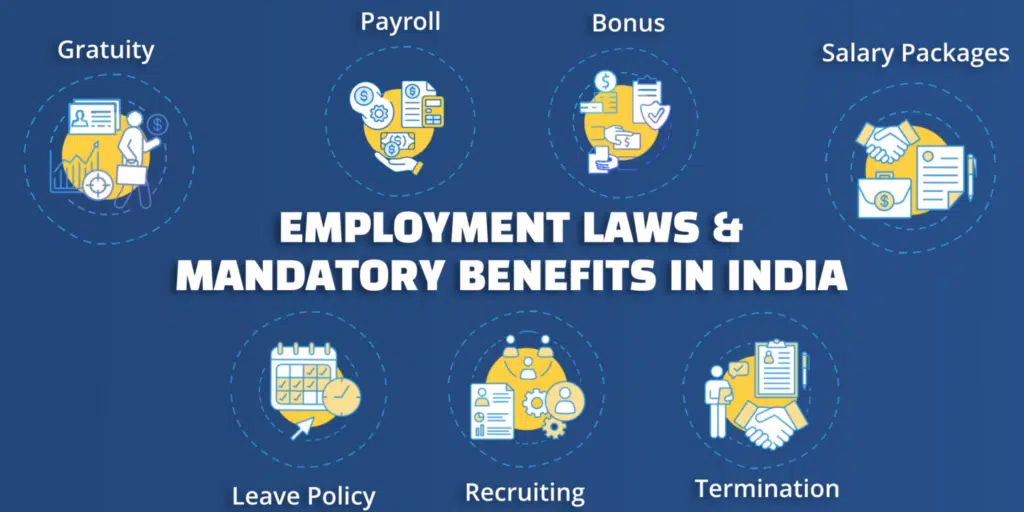Employment Laws and Mandatory Benefits in India

Do you know India is the second-largest country in speaking English? Yes, you read that right. There is more population in India that speaks English compared to the entire population of Canada or the United Kingdom or any other country in the world except the United States of America. This makes India an attractive country for Fortune 1000 companies to set up offshore companies as you can find tremendous talent with a broad spectrum of advanced skills. Businesses can hire resources from India to build a team of highly qualified workforce in industries including financial services, industrial production, engineering, business services, information technology, healthcare, and many more. But, before considering hiring talent from India, you should be aware of employment laws and benefits that are required to be provided to your Indian employees as per the laws of Indian central and state governments.
In this blog, we will give you an idea of all the rules and regulations that need to be followed while employing a resource in India and how Global Squirrels can take care of these for you.
Employee benefits and labor laws in India
1. Salary packages and allowances
Indian employees’ salary package includes considerable percentages of special allowances on top of the basic pay and it can be equated to approximately 40% of the total compensation. You may have to take children’s education allowances, house rent allowances, vehicle allowances, telephone or mobile phone allowances, leave travel allowances or concessions, and other special allowances into account. Determining the right amount for these payments which can be acceptable to your remote employees from India is a difficult chore in payrolling.
2. Special payment of Bonus Act 1965 in India
The Payment of Bonus Act 1965 applies to all organizations where at least 20 employees are present on any day during a year except a few miscellaneous workers. It refers to the mandatory payment of a bonus to every employee which is either a minimum of 8.33% of salary or Rs.100 whichever is higher.
3. Payroll Deductions and tax contributions in India
Employers should consider three payroll deductions for Indian employees which are employees’ provident fund (EPF), employees’ deposit-linked insurance scheme, and employees’ pension scheme. Usually, 12% of the salary is accounted to EPF which can serve as the pension for employees after retirement. An equal amount should be contributed to this by the employee and employer as per the acts. Among employers’ contributions to EPF, 3.67% amount goes to EPF and 8.33% moves to employees’ pension scheme (EPS) funds. Avoiding the provisions of EPF and EPS for employees can lead the companies to severe penalties by the government.
4. Leave policies in India
The leave policies to be defined in structuring a leave policy while hiring Indian workers are sick leave, casual leave, maternity leave, paternity leave, earned leave or privilege leave, bereavement leave, and comp offs. Sick leaves are allocable for employees who are ill and need time to recover from sickness. These leaves are obligatory as per the employment laws of India. Casual leaves are permitted for various reasons including vacation, family events, personal reasons, etc. The last amendment has revised the paid maternity leave duration from 12 weeks to 26 weeks for new mothers who work in a company with a minimum of 10 employees. A woman who is already a mother of two children and has a third baby and a woman who adopts a child of age below 3 months are also eligible for maternity leave for 12 weeks.
5. Recruiting process
Indian employment laws do not mandate any procedures or guidelines regarding recruiting a person from India. It is totally up to the companies to figure out the selection process according to their job description and additional requirements. But it is important to stick with fundamental human rights by avoiding discrimination on race, gender, and religion, and also ensure policies are in place to protect the personal information provided by applicants during the hiring processes.
6. Gratuity benefits for Indian employees
Every company with a minimum count of ten employees is subject to the payment of gratuity act in India. This act entitles an employee to 15 days of wage every year of service capped at Rs. 10,00,000.00. Employees will be able to avail themselves of the gratuity from a company when they resign after a minimum of 5 years of employment.
7. Termination of employees
Under Indian Labor Law, there is no regulated process to terminate any employee. The termination process is completely based on the terms and conditions predefined in the contract document signed by the employee and employer during the hiring process. If an employer wants to end employment with an individual due to any reason which is not defined in the agreement, then the company should strictly adhere to the Indian labor laws. Any unreasonable termination can initiate further employee disputes. Recommended practice for ending an employment relationship with an employee (or an employee resigning) is by giving a 30-day notice.
Summary
Looking at all the mandatory benefits and rules to pursue by every employer while hiring resources from India, it could take a big investment in terms of money and time by any business to build a global team to set up a local entity and ensure all legal compliances are met. With Global Squirrels, you can find and hire employees in an efficient way that will say you a lot of time and money if your intention is not to hire more than 50 employees from India. Global Squirrels will not only find an employee from India but will also take care of their payroll, and benefits and will ensure all Indian labor laws are followed while the employee works 100% for you.
Book a demo now and build an offshore team without you worrying about recruitment, setting up an office, or an entity in the office. Our simple and innovative Global Squirrels platform will make this happen in a frictionless way without talking to anyone (other than the employee you are going to interview and hire)
